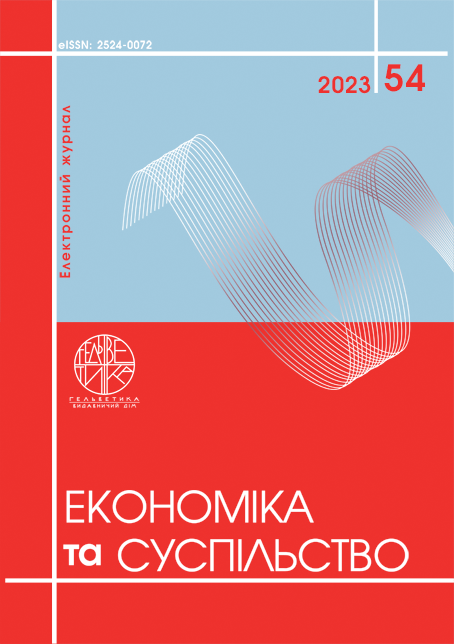EFFICIENCY OF ECONOMIC POLICY IN THE CONTEXT OF GROWING DIGITAL TRANSFORMATION
Abstract
In today’s world, where technologies and digital innovations are rapidly developing, the effectiveness of economic policy is becoming an important issue for countries and the global economy as a whole. The article explores the topical issue of economic policy efficiency in the context of the rapid development of digital transformation of modern society. The growing role of digital tools, platforms, and data in modern society and economy poses significant challenges to governments and regulators in formulating and implementing economic policies. The article examines the current problematic aspect of economic policy effectiveness in the context of active digital transformation, which is shaping new realities for global and regional economies. The growing digital transformation is affecting all aspects of the global economy, creating new opportunities and challenges for economic policy. The article analyzes the measures and strategies that can be most effective in managing the economic situation in the context of digital transformation. The key strategic directions that can be used to improve the effectiveness of economic policy in the context of digital transformation are considered, namely, creating a favorable regulatory environment for innovation, developing digital literacy skills, supporting small and medium-sized enterprises in the implementation of digital technologies, and investing in research and development. The research in this article identifies strategic challenges facing governments, businesses, and society in the context of digital transformation and provides recommendations for improving the effectiveness of economic policy. The research in this article helps to reveal the key challenges and opportunities arising from digital transformation and provides recommendations on optimal strategies for achieving effective economic policy in the new environment. This article is important for practitioners, researchers, and policy makers who are interested in modern economic policy in the context of digital transformation and seek to understand how to achieve optimal development in this new economic landscape.
References
Краус Н. М. Цифровізація в умовах інституційної трансформації економіки: базові складові та інструменти цифрових технологій. Інтелект ХХІ. 2018. № 1. С. 211–214.
Саух І. В., Шиманська В. В., Момонт Т. В. Цифрова економіка України: сучасний стан, тенденції, проблеми розвитку. Вісник Хмельницького національного університету. 2019. № 2. С. 228–234.
Цифровізація як нова реальність України. LexInform: Правові та юридичні новини, юридична практика, коментарі. URL: https://lexinform.com.ua/dumka-eksperta/tsyfrovizatsiya-yak-nova-realnist-ukrayiny/ (дата звернення: 12.09.2023).
European Commission. (2020). Shaping Europe’s Digital Future: Communication on the Digital Compass 2030. European Commission.
European Parliament. (2020). Report on a Digital Services Act: Improving the functioning of the Single Market. European Parliament.
The Economist. (2021). The Promise and Peril of Our Gene-Editing Powers. The Economist.
United Nations Conference on Trade and Development (UNCTAD). (2020). Digital Economy Report 2020: Cross-border data flows and development. UNCTAD.
World Bank. (2020). Doing Business 2020: Comparing Business Regulation in 190 Economies. World Bank Group.
World Economic Forum. (2021). The Global Risks Report 2021. World Economic Forum.
World Intellectual Property Organization (WIPO). (2020). World Intellectual Property Report 2020: Artificial Intelligence – A Race Between Policy and Technology. WIPO.
World Trade Organization (WTO). (2020). World Trade Report 2020: Government policies to promote innovation in the digital age. WTO.
Kraus, N. M. (2018). Tsifrovizatsiya v umovakh instytutsiynoyi transformatsiyi ekonomiky: bazovi skladovi ta instrumenty tsyfrovykh tekhnolohiy. [Digitalization in the context of institutional transformation of the economy: basic components and tools of digital technologies]. Intellect XXI. № 1. Р. 211–214. [in Ukrainian]
Saukh, I. V., Shimanskaya, V. V., Momont, T. V. (2019). Tsifrova ekonomika Ukrayiny: suchasnyy stan, tendentsiyi, problemy rozvytku [Digital economy of Ukraine: current state, trends, problems of development]. Bulletin of Khmelnytsky National University. № 2. Р. 228–234. [in Ukrainian]
Tsifrovizatsiya yak nova realnist Ukrayiny. LexInform: Pravovi ta yurydychni novyny, yurydychna praktyka, komentari [Digitalization as a new reality of Ukraine. LexInform: Legal and legal news, legal practice, comments]. Retrieved from: https://lexinform.com.ua/dumka-eksperta/tsyfrovizatsiya-yak-nova-realnist-ukrayiny [in Ukrainian]
European Commission. (2020). Shaping Europe’s Digital Future: Communication on the Digital Compass 2030. European Commission.
European Parliament. (2020). Report on a Digital Services Act: Improving the functioning of the Single Market. European Parliament.
The Economist (2021). The Promise and Peril of Our Gene-Editing Powers. The Economist.
United Nations Conference on Trade and Development (UNCTAD) (2020). Digital Economy Report 2020: Cross-border data flows and development. UNCTAD.
World Bank (2020). Doing Business 2020: Comparing Business Regulation in 190 Economies. World Bank Group.
World Economic Forum. (2021). The Global Risks Report 2021. World Economic Forum.
World Intellectual Property Organization (WIPO) (2020). World Intellectual Property Report 2020: Artificial Intelligence – A Race Between Policy and Technology. WIPO.
World Trade Organization (WTO). (2020). World Trade Report 2020: Government policies to promote innovation in the digital age. WTO.

This work is licensed under a Creative Commons Attribution 4.0 International License.


